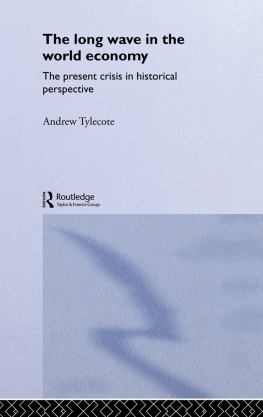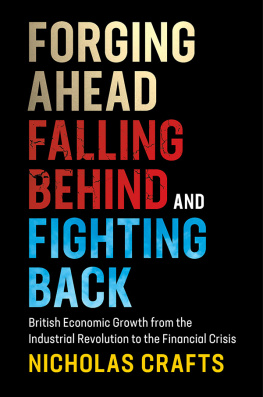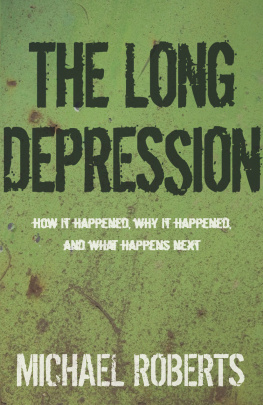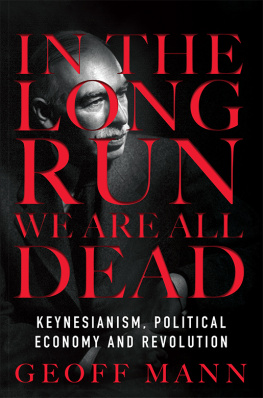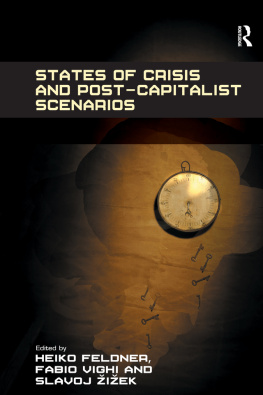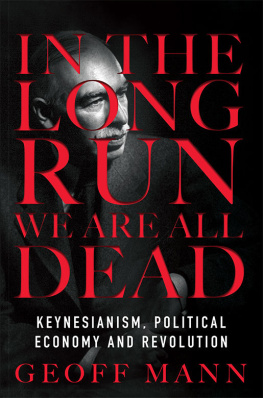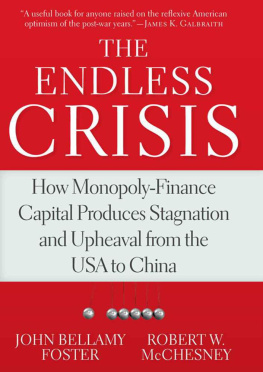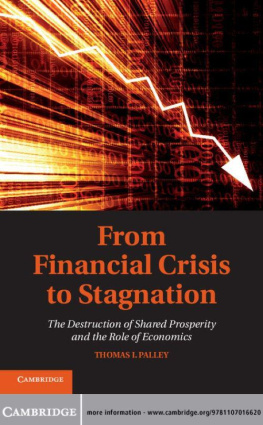Andrew Tylecote - The Long Wave in the World Economy: The Current Crisis in Historical Perspective
Here you can read online Andrew Tylecote - The Long Wave in the World Economy: The Current Crisis in Historical Perspective full text of the book (entire story) in english for free. Download pdf and epub, get meaning, cover and reviews about this ebook. year: 1993, publisher: Routledge, genre: Romance novel. Description of the work, (preface) as well as reviews are available. Best literature library LitArk.com created for fans of good reading and offers a wide selection of genres:
Romance novel
Science fiction
Adventure
Detective
Science
History
Home and family
Prose
Art
Politics
Computer
Non-fiction
Religion
Business
Children
Humor
Choose a favorite category and find really read worthwhile books. Enjoy immersion in the world of imagination, feel the emotions of the characters or learn something new for yourself, make an fascinating discovery.
- Book:The Long Wave in the World Economy: The Current Crisis in Historical Perspective
- Author:
- Publisher:Routledge
- Genre:
- Year:1993
- Rating:3 / 5
- Favourites:Add to favourites
- Your mark:
- 60
- 1
- 2
- 3
- 4
- 5
The Long Wave in the World Economy: The Current Crisis in Historical Perspective: summary, description and annotation
We offer to read an annotation, description, summary or preface (depends on what the author of the book "The Long Wave in the World Economy: The Current Crisis in Historical Perspective" wrote himself). If you haven't found the necessary information about the book — write in the comments, we will try to find it.
Andrew Tylecote: author's other books
Who wrote The Long Wave in the World Economy: The Current Crisis in Historical Perspective? Find out the surname, the name of the author of the book and a list of all author's works by series.
The Long Wave in the World Economy: The Current Crisis in Historical Perspective — read online for free the complete book (whole text) full work
Below is the text of the book, divided by pages. System saving the place of the last page read, allows you to conveniently read the book "The Long Wave in the World Economy: The Current Crisis in Historical Perspective" online for free, without having to search again every time where you left off. Put a bookmark, and you can go to the page where you finished reading at any time.
Font size:
Interval:
Bookmark:
The long wave in the world economy
The long wave in the world economy
The present crisis in historical perspective
Andrew Tylecote

First published 1992 by Routledge
2 Park Square, Milton Park, Abingdon, Oxon, OX14 4RN
Simultaneously published in the USA and Canada
by Routledge
a division of Routledge, Taylor & Francis
270 Madison Ave, New York NY 10016
Reprinted 2001
Transferred to Digital Printing 2006
Routledge is an imprint of the Taylor & Francis Group
1992 Andrew Tylecote
All rights reserved. No part of this book may be reprinted or reproduced or utilized in any form or by any electronic, mechanical, or other means, now known or hereafter invented, including photocopying and recording, or in any information storage or retrieval system, without permission in writing from the publishers.
British Library Cataloguing in Publication Data
Tylecote, Andrew, 1946
The long wave in the world economy: the present crisis in historical perspective.
1. Economics. Theories
I. Title
338.54
ISBN 0-415-03690-9
Library of Congress Cataloging-in-Publication Data has been applied for
To Marian
One day in the summer of 1979 my eye was caught by an advertisement in the corridor outside my office. Kings College, Cambridge was calling for research proposals on the long wave, with a view to a research fellowship. The long wave? As a student in the 1960s I had come across this implausible idea, that there were recurring cycles of boom and slump in the world economy, about every 50 years so that, for example, having had mass unemployment in the 1930s, we could expect more of the same by the late 1970s or early 80s. Implausible? Kings did not think so, and nor now did I. I had just finished my book on inflation the great economic issue of the 1970s which had treated rising unemployment as a side-effect of disinflationary policies; but the uneasy feeling had been growing, that there was a deeper crisis of which inflation and unemployment were each a part. After a few weeks reading of the long wave literature some ideas of my own began to form. I submitted a tentative theory and research programme. Kings judged them the best of the bunch but too vague.
This problem clearly required work acorss the whole range of the social sciences, on all the major Western economies and beyond, and ranging back in time from the present to the eighteenth century. Now there was to be no fellowship, no help. There matters rested, until the autumn of 1982, when on a visit to CEPREMAP in Paris (funded by the Economic and Social Research Council and the Counseil Nationale de Recherche Scientifique), I happened to show my long wave papers to Robert Boyer, who was working in the field. Boyer is intellectually as generous as he is brilliant: he told me I must return to the work; and encouraged me to present a paper at a conference on the long wave in Paris the following spring. At least two people there liked my paper: Immanuel Wallerstein, editor of Review, who published it; and my old teacher Chris Freeman, who invited me to follow it up as Visiting Fellow at the Science Policy Research Unit (SPRU) at Sussex University, the following year. The Economic and Social Research Council, and the Leverhulme Foundation, provided grants. Suddenly I found myself with the support I needed. There were several people at SPRU working on the long wave and glad to share their ideas Freeman himself, Luc Soete, Bengt-Ake Lundvall, and Carlota Perez. I found Carlota Perezs ideas particularly stimulating. Beyond that, SPRU is a Unit indeed. You may learn more there from your neighbour at coffee in ten minutes than from the average library in a day; and SPRUS library is not average. That summer we travelled to Manchester for a seminar with Rod Coombs, Vivien Walsh and others at UMIST new allies. Though I was back at Sheffield in the autumn, with a full teaching load, I was now confident that I could produce my own original theory of the long wave.
Originality, on big subjects, is not well received by the scholarly journals, unless perhaps from the already famous. (Review is an exception.) Lesser academics are well advised to limit themselves to adding to some pyramid of knowledge, one brick at a time. The rash, and stubborn, have one alternative: they can write a book. I showed an outline to my agent, Anthony Goff, who liked it. We found a publisher, Elizabeth Fidlon of Routledge, who was prepared to take it at our valuation. After that, all we needed was the book. I am afraid it took much longer than intended, and at one or two points I could wish that it had been a little more thoroughly researched. (The job should really have been done by an international consortium of interdisciplinary research institutes.) I could not have managed without the continuing help of Chris Freeman, who (among other things) saw to it that I was invited to present a paper one of the few detachable bricks at the Siena long wave workshop in December 1986. At Siena I met Solomos Solomou, who has since tempered successive drafts in the fire of his scepticism (well expressed in his own book), and Louis Fontvieille, who invited me to detach another brick at the Montpellier Workshop in 1987, and helped in discussion. I depended equally on the constructive criticism of John Westergaard, who (having done more than any one else to improve my last book) agreed to take this one in hand. In the later stages I was encouraged by Willy Brown, helped with the text by Marian Tylecote, and with the technology by my late father Ronnie Tylecote, aided in my travels by Sheffield Universitys Research Fund, and tactfully nagged by Alan Jarvis and Ruth Jeavons of Routledge. I am grateful to all those I have mentioned, and many others, who will certainly disagree with some of what follows, but may perhaps agree with Simon Kuznets, writing in the American Economic Review of 1955, who has the last word:
For the study of the economic growth of nations, it is imperative that we become more familiar with findings in those related social disciplines that can help us understand population growth patterns, technological change, the characteristics and trends in political institutions, and generally patterns of behaviour of human beings Effective work in this field necessarily calls for a shift from market economics to political and social economy. (Economic growth and income inequality, p. 28.)
Andrew Tylecote
The idea that economies and societies move in a circle is not attractive to the modern West. We march forward, and ever faster: that is our vision of progress, and it is supported by our measures of economic growth. Two centuries ago, in Britain of the Industrial Revolution, national income per head rose by less than 1 per cent per year. Now such a growth rate, sustained over a decade, would be regarded as shameful stagnation in any western country. Our concept of cycles in national income has been adjusted accordingly: downswings are defined as periods of deceleration, of slower growth; they do not often involve an actual decline in national income. Our cycles are growth cycles.
From the perspective of the South, the Third World, this attitude might seem smug. There, where the large majority of the worlds population lives, there is no such inevitability to increasing affluence. True, the total national incomes of Southern countries, as conventionally measured, have increased during the last half century by not much less than those of the North. But Southern populations have increased much more rapidly than Northern, over the same period.
If a large part of the worlds population may be suffering a decline in income per head, we cannot take it for granted that world income per head is on a rising trend. Periods of slow growth may be worse than they seem: downswing may mean just that. This should make us the more concerned to identify cycles in economic growth and their causes. The longer the cycle, the more concerned we should be, for the more prolonged the misery in the downswing. The longest economic cycle if indeed it exists is the the Kondratiev cycle, or long wave, of about half a century from peak to peak or trough to trough. The long boom of about 194873 has been described as a long wave upswing in the world economy. Before it, the depression of the 1930s would have been part of a long wave downswing (the precise beginning and end of which would be arguable). Since 1973 or thereabouts there has been another period of slow growth or worse to which falling living standards in the south, crisis in the east, and high unemployment in most of the west have borne witness. This would be another downswing. If there is such a regular cycle in the world economy, we can expect the downswing to continue until about the end of this decade; whereupon a new long boom will begin.
Next pageFont size:
Interval:
Bookmark:
Similar books «The Long Wave in the World Economy: The Current Crisis in Historical Perspective»
Look at similar books to The Long Wave in the World Economy: The Current Crisis in Historical Perspective. We have selected literature similar in name and meaning in the hope of providing readers with more options to find new, interesting, not yet read works.
Discussion, reviews of the book The Long Wave in the World Economy: The Current Crisis in Historical Perspective and just readers' own opinions. Leave your comments, write what you think about the work, its meaning or the main characters. Specify what exactly you liked and what you didn't like, and why you think so.

